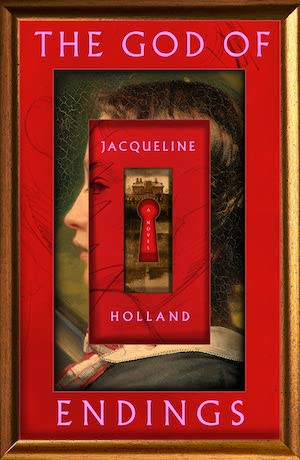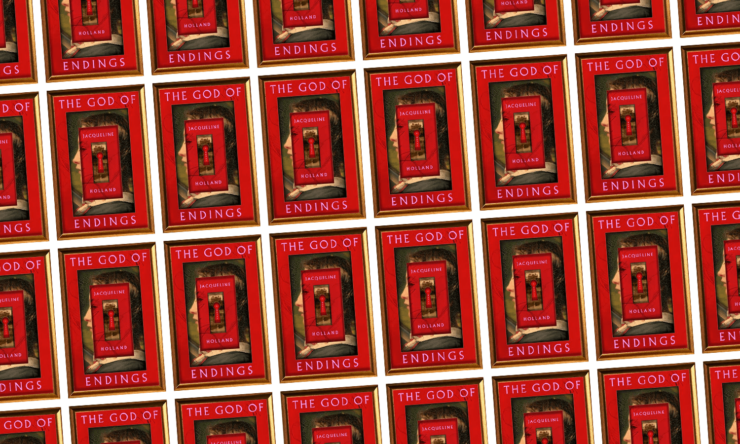Jacqueline Holland, in her debut novel, avoids calling her blood-drinking immortals vampires. They don’t fear the sun or garlic, and no one here is turning into a bat. But when a previously dead creature rises from the earth, deathless and feeding only on blood, one might, I hope, be forgiven for using the shortcut. (Holland does, in multiple interviews; she clearly did her research.)
And what an odd vampire book this is. The story of an immortal named, over the decades, Anna or Anya or Collette, it feels at different times like a story about fear and loss; about not knowing what you want; about avoiding the world as often as engaging with it; and about ambivalence.
Anna’s first years, in the 1830s, are spent as the daughter of a gravestone carver—a young life close to death in many ways, and all the more so when tuberculosis comes to town, and the townspeople’s reaction to an illness they do not yet understand is less than savory. When Anna becomes an orphan, her grandfather comes to fetch her. He is not her grandfather by blood, but he becomes blood family when he gives her the immortal life she never asked for.
Grandfather calls her Anya, and before long he sends her across the sea with his hulking butler, Agoston. For all the misery Anna has already experienced, there’s much more to come, including an attempted sexual assault and the first instance of Anna letting down some even-worse-off children.
Buy the Book


The God of Endings
The assault is attempted but not committed only because when she became a vampire, Anna’s sexual organs simply vanished. I know we have had sexless vampires before but this struck me as a strange choice; is it to keep her from enduring this potential situation, or to take away one possible means of connection and intimacy with others? Anna is a distant cousin to V.E. Schwab’s Addie LaRue, but for better or worse, Addie lives a physical life, a life embodied, in a way that Anna does not—at least, except when it comes to hunger.
In the present, Anna is called Collette LeSange, and she runs a school in the very house her grandfather brought her to as a child. She teaches well-off young children French and art, among other things. One of the students, sickly Leo, draws especially on her sympathy: His secret-keeping parents often forget him, and he has an incredible talent for art. Collette, who spent many of her long years in the woods with a painter, is drawn to his talent and his fragility.
But there’s something weird going on with her—a desire to nest, to dig; a constant hunger, one that causes blackouts and leads her to do something unforgivable; and a looming sense of the god of endings, Czernerbog, who she learned about in a cabin deep in the European woods, where Agoston took her after their ocean voyage.
The god of endings draws nearer, she thinks—but what is it that’s ending? And when something ends, does something else begin?
That home in Europe, like her first home, is destroyed by violence and death, and this becomes a repeating pattern: She finds something that feels like home for a little while, but tragedy or ordinary human mortality happens, and she starts over. Only once does she have a female friend, and there are no other female immortals in this book, which struck me as another purposefully isolating (and narratively limiting) choice.
But Collette is also self-isolating, self-limiting, unsure. She learns to paint but seems to take little joy in it. She could be a protector, a defender, of the children she’s drawn to, but it takes long decades before she begins to figure this out.
Holland sets her pace with admirable certainty: stately, careful, alternating present-tense chapters in the book’s 1980s present with past-tense tales from the many phases of Collette’s life. The lines are elegantly drawn, the prose precise, the purposefully cool voice that of a woman who has not learned to process her hurts.
The narrative choices are harder to admire. Anna lives through decades of massive change in the world, but engages with none of it (she does kill a few Nazis, at least). An interlude in the Bronx is curious and baffling, and indicative of how race is handled awkwardly throughout. Some will find Collette frustrating, slow to learn, lacking in hope or curiosity about the world in which she could have such free rein—a freedom she is incapable of seeing. Her limitations are well drawn, but I found myself longing for just a whisper of Tilda Swinton’s Eve in Only Lovers Left Alive—her passion for a world that even the immortal can never know entirely. For an artist, Collette is in some ways strangely uninventive. Why does she paint? To forget herself. Holland describes her process with rich specificity, but the distance sits between us and her work, and from the feelings she describes having. We are still outside the frame. It’s an almost admirable consistency throughout the novel, that distance.
Here is where I must get spoilery.
When I first finished The God of Endings, I found it hard to read it as anything but a story about how life—even, or perhaps especially, immortal life—is meaningless without children. (Though it is quite lovingly broad about what children, and family, mean; Leo is not Collette’s child by birth, but she makes him hers by blood.) That is what brings her peace, in the end: transforming Leo as she was transformed. There is another layer here, which is that she sees in Leo a talent that she can foster.
But peer a bit closer and you realize there are no promises of happiness. Collette goes to great lengths to claim Leo—and at least one of his parents is so awful that it’s a bit easier for her than it might have been—but there are no guarantees. Will he be grateful for her gift, as she was not? Will he keep painting? Will he love her at all, or will he be afraid or angry? Is this a clever way to pose a very human question—Why do I want kids?—or a strange thing to do with vampire mythos, which is often about subverting the expectations of humanity?
It can, of course, be both, just as one can be both annoyed with and impressed by a novel; just as a book can be a vampire story and a work of literary fiction. The God of Endings occupies a strange space, and it certainly makes me wonder what shapes and space Holland will write her way into next.
The God of Endings is published by Flatiron Books.
Molly Templeton lives and writes in Oregon, and spends as much time as possible in the woods. Sometimes she talks about books on Twitter.










